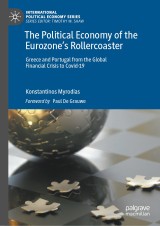Details
The Political Economy of the Eurozone's Rollercoaster
Greece and Portugal from the Global Financial Crisis to Covid-19International Political Economy Series
|
106,99 € |
|
| Verlag: | Palgrave Macmillan |
| Format: | |
| Veröffentl.: | 30.04.2024 |
| ISBN/EAN: | 9783031421983 |
| Sprache: | englisch |
Dieses eBook enthält ein Wasserzeichen.
Beschreibungen
<p>Global crises throughout history have shaken humanity and transformed economies and societies. The Eurozone faced two such crises soon after its foundation. This book brings new insights regarding the Eurozone’s response to the Global Financial Crisis in 2008 and the Covid-19 pandemic and its effectiveness in dealing with the macroeconomic imbalances in Europe. Is the Eurozone more resilient now? This book is an indispensable addition to the literature on the recent global crises and the Eurozone for both academics and policymakers who are eager to delve deeper into these vital questions.<br> </p>
<p>Chapter 1. Introduction.- Chapter 2. The Neoclassical and Keynesian perspectives and the rebirth of Comparative Political Economy.- Chapter 3. From the birth of the Euro to the Eurozone crisis: What went wrong?.- Chapter 4. The European response to the global financial crisis: Reinforcing the status quo?.- Chapter 5. The bailout programmes in the ‘intermediate’ economies.- Chapter 6. The European response to Covid-19: A break with the past?.- Chapter 7. Conclusions.</p><div><p><b><br></b></p><b></b></div>
<p><strong>Dr Konstantinos </strong><strong>Myrodias</strong> is Lecturer in International Political Economy at King’s College London and a Visiting Fellow at the London School of Economics. </p>
“Dr Myrodias makes an important contribution by showing how the response to the recent crises solidified Greece and Portugal’s subordinate position in the Eurozone. This was part-engineered in the interests of northern European economies – a dismaying replay of how European colonial states earlier engineered the dependent status of their colonies to boost their own economic growth and political power. P<em>lus ça change…”</em><p><b>- Robert H. Wade</b>, Professor of Political Economy, London School of Economics (LSE) Leontief Prize for Advancing the Frontiers of Economic Thought (2008)<b></b></p>
<p>“Dr Myrodias’ concise and brisk analysis of the fate of Greece and Portugal in recent crises has numerous distinctive virtues. Of these, the most important is that Dr Myrodias frames the core issues as matters of economic theory. A more compelling test of theoretical economics is difficult to imagine.” </p>
<p><b>- James K. Galbraith, </b>Lloyd M. Bentsen Jr. Chair in Government/Business Relations and Professor of Government, University of Texas at Austin<b></b></p>
<p>“The Euro Area has lurched from crisis to crisis in the near quarter of a century since its foundation. In this fascinating overview Dr Myrodias takes us carefully through these events that have at various times threatened its very existence.” </p>
<p><b>- Jagjit S. Chadha, </b>Director of the National Institute of Economic & Social Research (NIESR), London, UK</p>
Global crises throughout history have shaken humanity and transformed economies and societies. The Eurozone faced two such crises soon after its foundation. This book brings new insights regarding the Eurozone’s response to the Global Financial Crisis in 2008 and the Covid-19 pandemic and its effectiveness in dealing with the macroeconomic imbalances in Europe. Is the Eurozone more resilient now? This book is an indispensable addition to the literature on the recent global crises and the Eurozone for both academics and policymakers who are eager to delve deeper into these vital questions. <b></b><p></p>
<p><b>Konstantinos </b><b>A. </b><b>Myrodias</b> is Lecturer in International Political Economy at King’s College London and a Visiting Fellow at the London School of Economics. </p>
<p>“Dr Myrodias’ concise and brisk analysis of the fate of Greece and Portugal in recent crises has numerous distinctive virtues. Of these, the most important is that Dr Myrodias frames the core issues as matters of economic theory. A more compelling test of theoretical economics is difficult to imagine.” </p>
<p><b>- James K. Galbraith, </b>Lloyd M. Bentsen Jr. Chair in Government/Business Relations and Professor of Government, University of Texas at Austin<b></b></p>
<p>“The Euro Area has lurched from crisis to crisis in the near quarter of a century since its foundation. In this fascinating overview Dr Myrodias takes us carefully through these events that have at various times threatened its very existence.” </p>
<p><b>- Jagjit S. Chadha, </b>Director of the National Institute of Economic & Social Research (NIESR), London, UK</p>
Global crises throughout history have shaken humanity and transformed economies and societies. The Eurozone faced two such crises soon after its foundation. This book brings new insights regarding the Eurozone’s response to the Global Financial Crisis in 2008 and the Covid-19 pandemic and its effectiveness in dealing with the macroeconomic imbalances in Europe. Is the Eurozone more resilient now? This book is an indispensable addition to the literature on the recent global crises and the Eurozone for both academics and policymakers who are eager to delve deeper into these vital questions. <b></b><p></p>
<p><b>Konstantinos </b><b>A. </b><b>Myrodias</b> is Lecturer in International Political Economy at King’s College London and a Visiting Fellow at the London School of Economics. </p>
Looks at crisis management in Southern Europe after the 2008 economic crisis and Covid-19 Examines the efficiency of the economic policies put in place to deal with the two crises Questions whether the lessons learned in 2008 were properly applied after Covid-19



















